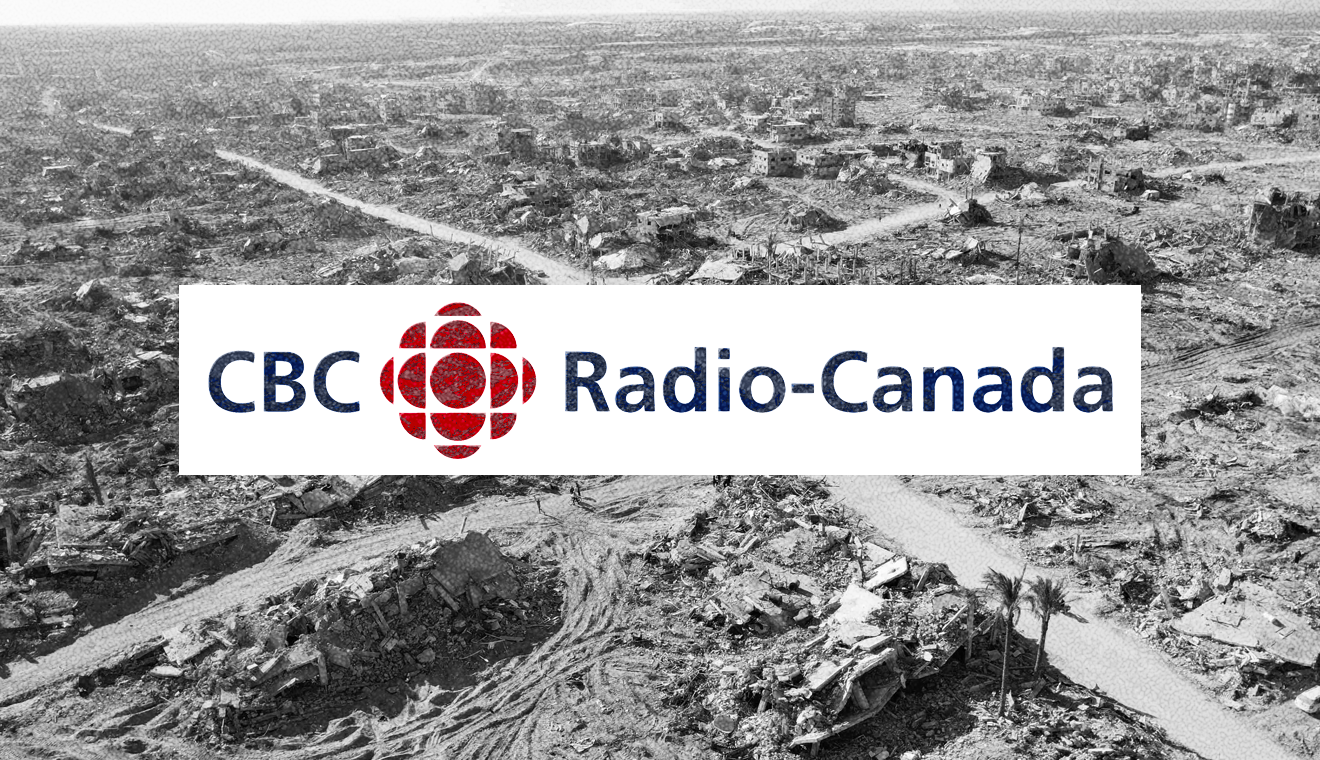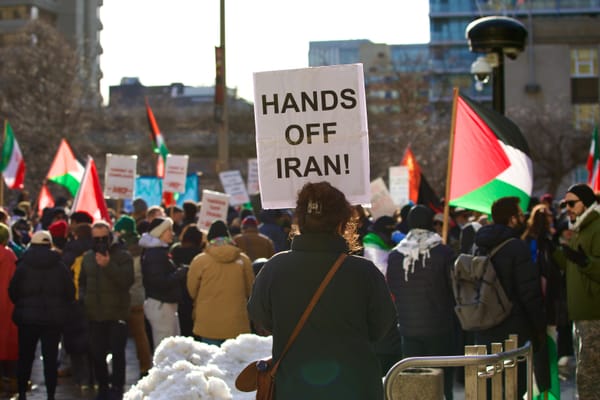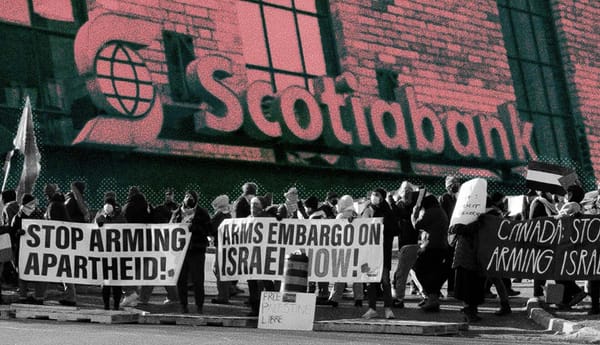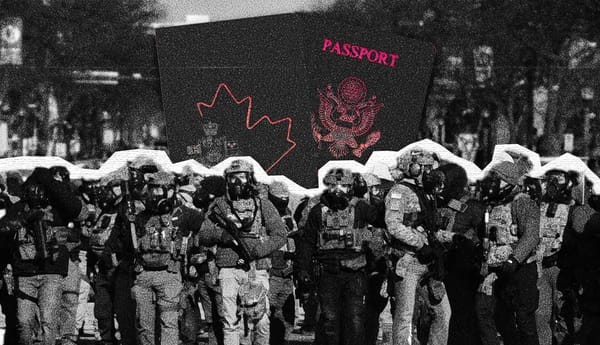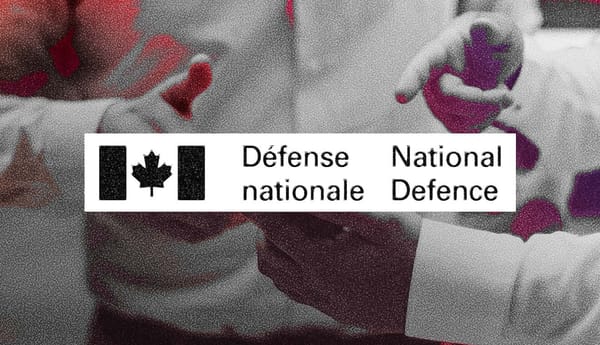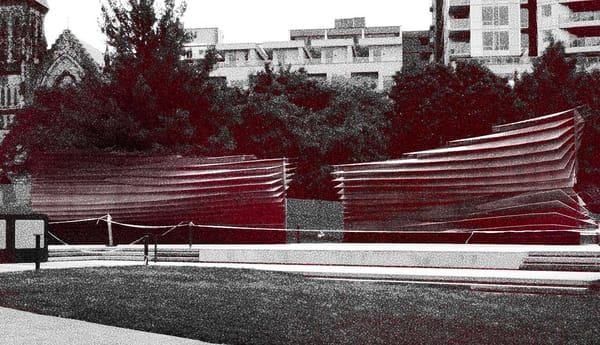The CBC made an agreement with a Jordanian air base commander not to record or show aerial images of Gaza while reporting on board a recent aid drop flight, according to a spokesperson for the public broadcaster.
The agreement was based on instructions from Israeli officials.
The Jordanian officials said the Israelis warned that filming out of the plane’s windows over Gaza would supposedly “jeopardize flights,” wrote CBC head of public affairs Chuck Thompson in an email to The Maple.
“Filming out the windows was not permitted; this was made clear to us in advance by the Jordanian officials,” wrote Thompson.
Asked if either the Israeli or Jordanian officials elaborated on how filming out of the plane’s windows would jeopardize the flights, Thompson deferred to the officials themselves.
Meanwhile, the British broadcaster ITV News seemingly did not agree to the same censorship order, and showed footage of the destruction of Gaza caused by Israel’s nearly two-year bombardment of the enclave.
An ITV segment broadcast on August 4 opened with stark images of the Gaza landscape in ruins. In a voiceover, ITV international editor Emma Murphy — who, like her CBC counterpart, flew on board a Jordanian aircraft — said:
“Building by building, Gaza is being erased. Cities like broken skeletons, laid waste by war. Graveyards of life and lives. The streets, homes and coffee houses of old, now cast to the ground. The soul of this place along with the souls who lived here, brought to ruin in the rubble and dust.”
Murphy noted that Israel bans foreign journalists from entering Gaza and explained that when she joined an air drop the previous week, she was told “Israel didn’t want images from above being filmed or shown.”
The segment highlighted images captured from on board the aircraft of a Gaza hospital, seniors’ home, school and residential buildings destroyed by Israel.
“This landscape of destruction looks otherworldly. Yet it’s not. It is this world, and what is happening may yet come to define one of its darkest eras, one that casts a stain on humanity, which will endure for generations.”
In January, the United Nations used satellite imagery to estimate that 69 per cent of all structures in Gaza were damaged or destroyed as a result of Israel’s attacks.
The CBC’s report, which also aired on August 4, did not show images of Gaza from the aircraft.
CBC reporter Susan Ormiston told viewers from on board a different Jordanian plane to the one carrying the ITV crew: “We cannot show you what we see outside these windows. The Israelis have forbidden any media images of what’s happened down on the ground. But we can see the flattened landscape of neighbourhoods.”
The Royal Jordanian Airforce website states that two of its aircraft have participated in aid drops over the past few days. Thompson said the CBC and ITV film crews were on board separate flights.
The Maple emailed ITV questions about its apparent decision to not agree to the censorship order, but did not receive a response.
Thompson defended the CBC’s coverage of the aid drop flight and its reporting on Israel’s war on Gaza in general. He said that despite the agreed-upon filming restrictions, the broadcaster considered the aid drop story to be in the public interest and journalistically worthwhile.
“It should be noted that for this story, we also organized our freelance videographer to capture images of the aid landing inside Gaza on the ground,” Thompson wrote.
“Beyond this particular story, we have been telling Canadians what’s been happening in Gaza on the ground in a myriad of other ways.”
Asked why the CBC crew did not travel on board a Canadian aid drop flight that reportedly flew just behind one of the Jordanian aircraft, Thompson said: “Canadian defence officials told us it was not possible to get on their plane.”
In an emailed statement received after this story was published, Department of National Defence spokesperson Andrée-Anne Poulin told The Maple:
“After assessing the layout of the inside of the CC-130 Hercules aircraft, including space necessary for mission-essential personnel, the Air Task Force leadership determined that inviting a journalist and/or cameraperson onboard would not have been safely feasible.”
In an extended version of the CBC segment, Ormiston said the crew was not allowed on the Canadian flight due to “Israeli restrictions and risk considerations.”
Jason Toney, director of the advocacy group Canadians for Justice and Peace in the Middle East’s media accountability project, told The Maple the CBC’s editorial decision to not film Gaza “clearly acquiesced to an Israeli directive, and they failed the Canadian public.”
“I think it’s just another example of Canadian media complicity in the ongoing genocide.”
Toney said that simply describing the destruction of Gaza verbally, as Ormiston did, was not sufficient given the unique opportunity the CBC crew had to visually lay bare the devastation caused by Israel’s attacks.
“We hear numbers about what percentage of Gaza has been damaged or destroyed, and those numbers are very shocking, but without a visual accompaniment to understand the scope of that destruction, Canadians and people around the world are really limited in what they’re able to grasp of what’s really going on on the ground.”
“The only visuals that we’re getting out of Gaza are very limited. They’re what Palestinian journalists on the ground are able to show us, and as we know, they are not only trying to report, they’re trying to survive.”
According to Reporters Without Borders, Israel has killed “more than 200” journalists in Gaza since October 2023, including at least 46 who were targeted specifically because of their journalistic activities.
This past Sunday, Israel killed five Al Jazeera staff and one other journalist, including correspondent Anas al-Sharif, who was the primary target of the attack. An analyst at the Euro-Med Human Rights Monitor said there was “zero evidence” showing al-Sharif took part in any hostilities, as claimed by Israel.
Toney said that while the CBC has published some strong reporting on Israel’s war on Gaza, he accused the public broadcaster of engaging in a pattern of “self censorship” in its coverage.
He noted that the CBC rarely uses the word “genocide,” even with qualifiers that cite reputable sources, when reporting on Israel’s ongoing attacks.
Criticisms of the CBC’s coverage of Israel’s war on Gaza are not new.
In December 2023, The Breach found that CBC News’ The National featured 42 per cent more Israeli voices than Palestinian in the first month of its coverage of Israel’s attacks.
The Breach also highlighted how the public broadcaster used sanitized language to describe Israel’s war on Gaza, while favouring much stronger words to describe the Hamas-led attacks of Oct. 7, 2023.
The CBC defended its decision to do so on the basis that attacks on Gaza are “carried out remotely.” In a statement to The Breach, the public broadcaster said it rejected any suggestion that its defence constituted “an admission of a double standard.”
Last year, The Breach published a pseudo-anonymous essay by a former CBC employee who accused the broadcaster of “whitewashing” Israel’s attacks on Gaza and engaging in editorial double standards that applied more scrutiny to Palestinian guests than Israelis and Israel’s supporters.
The former employee also wrote: “Most shows on the network seemed to avoid airing any mention of ‘genocide’ in the context of Gaza.”
According to The Breach, the CBC began to use the word on some occasions following the International Court of Justice’s hearings in early 2024 on South Africa’s ongoing genocide case against Israel.
In a statement responding to the essay, CBC editor in chief Brodie Fenlon wrote that the article’s “broad conclusions are not true. We don’t whitewash or censor our journalism.”
“That said, there’s no doubt some CBC journalists will see in this account moments that ring true to their own experience [...] Among the systemic issues we are currently addressing, newsroom culture is a challenge we are seized with at the CBC, one we are continually working to improve.”
The essay prompted more CBC employees to come forward. Five told The Breach that the essay resonated with them, shared similar experiences of dealing with anti-Palestinian bias and said they feared being labelled as antisemitic.
In response to questions from The Breach, Chuck Thompson wrote: “We have taken a number of measures to support staff through [the story], always working toward a more inclusive newsroom environment.”
“Our coverage is strong and has improved, in part thanks to internal feedback by many employees from a wide range of backgrounds and seniority levels, including months ago from the author of The Breach essay. Critical voices are not silenced, they are encouraged.”
The CBC has also been criticized for acquiescing to pressure campaigns from HonestReporting Canada, a billionaire-funded pro-Israel charity that, in its executive director’s words, seeks to “control the narrative” in Canadian media coverage of Israel.
Israel’s war on Gaza has to date killed at least 61,709 Palestinians, according to Gaza health officials, and is almost universally recognized as a genocide by major international human rights organizations, as well as by leading genocide scholars.
The actual death toll has likely been significantly undercounted, according to a study published by The Lancet in February. A letter sent to the same publication last year suggested that “it is not implausible to estimate that up to 186,000 or even more deaths could be attributable to the current conflict in Gaza.”
A recent Angus Reid poll found that 52 per cent of Canadians agree that Israel is committing a genocide, and 64 per cent see the current humanitarian situation as a “moral outrage.”
Famine Photo Op
Canada’s aid drop over Gaza on August 4 was organized by the Canadian Armed Forces, and was the first that involved the use of a Canadian aircraft. The aid flights, which involved a total of six countries and departed out of Jordan, were organized in co-ordination with the Israeli military.
Such aid drops have been heavily criticized as carefully stage-managed but ultimately ineffective and dangerous publicity stunts that do little to alleviate the famine in Gaza, which Israel has caused by deliberately blocking sufficient aid access.
The Israeli-imposed starvation crisis has so far killed 217 Palestinians, including 100 children, according to Al Jazeera.
In late July, an Integrated Food Security Phase Classification alert warned: “The worst-case scenario of Famine is currently playing out in the Gaza Strip ... Mounting evidence shows that widespread starvation, malnutrition, and disease are driving a rise in hunger-related deaths.”
The alert stated that more than 20,000 children in Gaza City were admitted for treatment for acute malnutrition between April and mid-July, with more than 3,000 severely malnourished.
Following several months of images of starving children pouring out from the besieged enclave, governments around the world pressured Israel into announcing it would allow more aid to enter Gaza in July.
But the United Nations Office for the Coordination of Humanitarian Affairs said on August 5 that the quantities of aid remain insufficient and “massive food shortages” persist.
Doctors have warned the long-term effects of prolonged starvation may already be irreversible for some Palestinians, especially children.
Meanwhile, multiple reports found that Israeli troops and American contractors shot at starving Palestinians at aid sites organized by the U.S.-Israeli backed Gaza Humanitarian Foundation (GHF).
In a recent report, the organization Doctors Without Borders said GHF-run distribution centres in Gaza are sites of “orchestrated killing and dehumanization” that must be shut down and replaced by existing UN-run distribution systems.
In July, the UN Human Rights Office reported that since May, at least 1,373 Palestinians have been killed while seeking food, 859 of them within the vicinity of GHF sites.
Last October, Israeli lawmakers voted to ban UNRWA, a UN-run Palestinian aid agency.
The Israeli government approved a plan last week for the Israeli military to directly re-occupy Gaza City, a move that will likely force all of the city’s remaining civilian residents into camps.
The proposal is a precursor to the Israeli government’s larger plan to take complete military control of the entire enclave.
The leaders of some countries allied with Israel, including Canada, Germany and the United Kingdom, condemned the plan.
Editor’s note, Aug. 12, 2025, 1:40 p.m. EST: This story has been updated to include a statement from the Department of National Defence that was received after the story’s publication.


